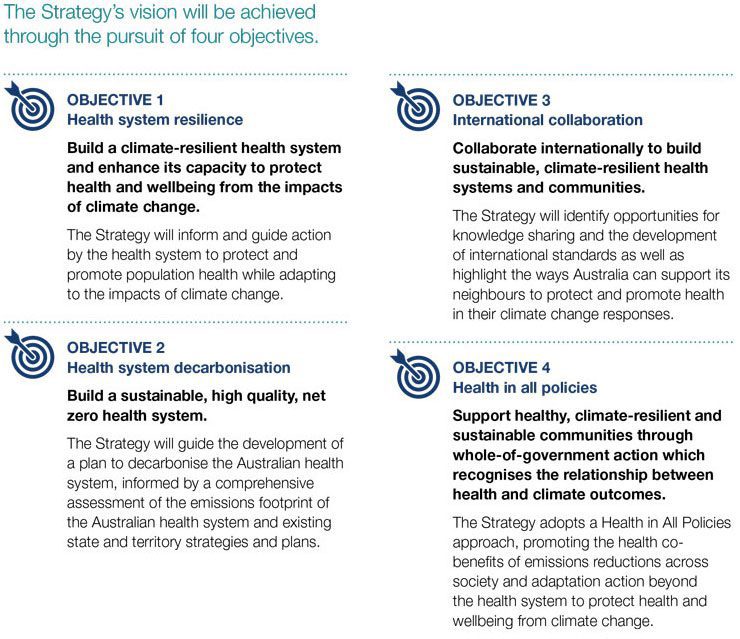National strategy focused on health and climate
A vision for a healthy, climate-resilient communities, and a sustainable, resilient, high-quality, net zero health system.
The health sector is the largest generator of carbon emission in the Government portfolio and as Queensland’s largest hospital and health service we realise the importance for the health sector to play its part in a transition to a net zero economy by 2050.
Encouragingly, Australia just released its first National Health and Climate Strategy (December 2023) which sets out a plan for the transition to a net zero health system and the strengthening of climate resilience of our health systems.
It frames a vision to build a climate-resilient net zero health system, and to protect population health and wellbeing from the impacts of climate change, that also adheres to the health profession’s ethos to ‘first do no harm’.
Four objectives and a range of actions have been identified to support these goals over the next five years, and lays out a program of work to be undertaken over the coming decades.
While reducing emissions from the physical aspects of hospital environments are familiar – buildings, waste management, energy reduction – changes in the clinical environment and models of care offer will present untapped opportunities, including new or alternative approaches to consumables, dialysis methods, and anaesthetic gases.
In both the operational and clinical environment, a more environmentally sustainable approach to health delivers more than just the environmental benefit, there are significant cost savings to be made which will allow us to re-invest these savings back into healthcare.
I am proud to say that a range of work to achieve better health and wellbeing outcomes by reducing our carbon footprint across our hospitals and health service is already underway at Metro North Health.
We are leading the transition to environmentally sustainable and climate resilient healthcare in Queensland actively contributing to the global efforts towards a more sustainable and resilient healthcare future.
Change across all professions at our health service is needed, and widely encouraged and all staff have a positive role to play in reducing the environment impact of the health system.
Metro North has a number of initiatives outlined in the national climate and health strategy already in action (notably, objective 2), and recognises many more opportunities and work to be done to achieve a more resilient healthcare system. For us the future looks bright as we progress with targeted activities encompassed in the Green Metro North Sustainability Strategy 2021-2026.

(Source: National Health and Climate Strategy, December 2023)
OBJECTIVE 1: Health system resilience
Build a climate-resilient health system and enhance its capacity to protect health and wellbeing from the impacts of climate change.
| Action area | Metro North’s actions |
| Health and climate risk assessment and health adaptation planning | The Climate Risk Adaptation Infrastructure Committee (CRAIC) was established in 2023 to focus on identifying and mitigating climate risks associated with Metro North infrastructure to build reliability and resilience for business continuity in the face of climate change. In 2024, formal climate risk assessments for Metro North’s facility portfolio will be undertaken. |
| Prevention: the starting point for health system adaptation | By undertaking climate risk assessments and decarbonisation pathway planning using evidence-based methodologies, we will know where we currently stand and what we need to do to adapt to climate change. |
| Working in partnership to protect the health of First Nations communities | Metro North respectfully acknowledges First Nations wisdom and experience and engages with community to ensure a collaborative and inclusive approach, including First Nations considerations in the development of the Urban Greening Guidelines and caring for Country |
| Protecting health by building a climate-resilient healthcare sector | Metro North has been at the forefront of climate action across the hospital and health service sector in Queensland and actively collaborates with other health services and contributes to building the body of knowledge and experience in climate resilience and sustainability across our sector as we journey together into the future. We are an active member of Global Green Healthy Hospitals and regularly contribute to and participate in this network across Australia and internationally. |
OBJECTIVE 2: Health system decarbonisation
Build a sustainable, high-quality, net zero health system.
| Action area | Metro North’s actions |
| Measuring our emissions |
|
| Reducing emissions from the delivery of clinical care and through our built environment, energy and water |
|
Travel and transport
|
|
Medicine and gases
|
|
| Food and catering | Sustainable Food Implementation Plan (in development) will determine activities in provision of food service across our hospitals with a focus on reducing food waste and packaging, reducing the energy footprint of kitchens.
|
| Water and resource use – reduce, reuse, reprocess, refurbish, recycle, replace, and waste segregation. |
|
| Supply chain – around 70%o the health system’s global emissions comes from the supply chain, including production, transport and disposal of health-related goods such as medicine. |
|
OBJECTIVE 3: International collaboration
Collaborate internationally to build sustainable, climate-resilient health systems and communities.
| Action area | Metro North’s actions |
| Collaboration and partnering |
|
OBJECTIVE 4: Health in all policies
Support healthy, climate-resilient and sustainable communities through whole-of-government action which recognises the relationship between health and climate outcomes.
| Action area | Metro North’s actions |
| Built environment | ‘Health in all policies’ approach means that government’s social, economic and planning policies will embed parameters to ensure that the link between climate and health outcomes is taken into consideration across all sectors. Metro North will continue to adhere to Queensland Government policies as they evolve to encompass climate change and health. We are already well placed in this commitment through our Green Metro North Sustainability Strategy 2021-2026 that encompasses a comprehensive across all aspects of the organisation including natural and built environments, clinical care and operational activities. |
